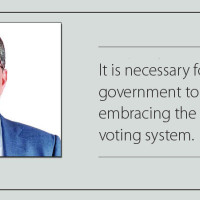- Wednesday, 11 February 2026
China's BRI and Nepal
Aarati Neupane
The Belt and Road Initiative (BRI), which began in 2013, is a modernised version of the 114 BCE Silk Road Initiative and the Maritime Silk Road of the 21st Century, envisioned by Chinese President Xi Jinping. This endeavour aspires to improve China's economic integration and network with Asia, Europe, and Africa. According to The Economist (2017), the BRI will be worth about US $1.3 trillion involving 900 infrastructure projects.
The BRI implementation is expected to result in a win-win situation for China as well as the participants of this big initiative. This operational plan looks forward to promoting, organising, and enhancing economic exchanges through efficient resource allocation, and deep market amalgamation. This will have an extensive impact on the global economy as nations from almost all continents are part of the 'Belt and Road' project.
Visionary plan
The BRI is often compared with the Marshall Plan even if it surpasses the size and ambitions of the Marshall Plan. China seeks to counter the US's deep-rooted influence throughout the world by enforcing close economic and cultural ties with different parts of the globe. From a realist perspective, this approach can be interpreted as a master plan to reshape the international order by replacing the hitherto prevailed supremacy of the US. As per The Times of India (2017), China desires to break the domination of the US in the Indo-Pacific region and contain the rise of India as an emerging power in the South Asian region by accomplishing the strategic objectives of BRI.
Nepal joined the BRI network in 2017, becoming the first country in South Asia to be involved in it. Indeed, we have realised the importance of balanced partnerships in trade since the economic blockade imposed by India while the massive 2015 earthquake wreaked havoc in Nepal. Thus, enforcement of the BRI connectivity will help Nepal to break free from the economic dependency on its southern neighbour. According to the World Bank, the investment in infrastructure statistically about 12 per cent of the GDP over a decade is essential for the nation to maintain its economic growth.
Nepal is determined to achieve higher economic growth through an economic and social transformation to reach the long-term vision of prosperity. Similarly, the Fifteenth Plan (2019/20-2023/24) has internalised the development of internal and cross-border interconnectivity in the national strategy. Nepal aspires to accomplish Sustainable Development Goals (SDGs) by 2030 and graduate to middle-income status.
In the limitations of the geopolitical block for improved connection outside neighbouring countries -- India and China; the BRI is a crucial concern of the economy, commerce, and investment of our nation. The Nepal government desires to embrace the ´Look China Policy´ as an alternative prospect of partnership and collaboration while China has been increasing its foreign investment in Nepal. In this circumstance, BRI opens a gateway to foster Nepal´s economic development as well as China´s prosperity.
Despite Nepal´s landlocked geopolitical situation, it has a strategic location and a transit bridge between two giant economies. Moreover, the country has opportunities to enhance the bilateral relationship between India and China in terms of trade and market. Nepal´s abundant natural resources and its huge potential for hydropower, tourism and agriculture can be best utilised with this connectivity. In the context of sluggish social, economic, and technological development, BRI will assist develop, sustain and transform the supply chain reducing the operations cost while also smoothing imports and exports.
Despite Nepal´s agreement with BRI, feasibility, and consequences of these initiatives have been a debated issue since its commencement. Furthermore, the national security and geopolitical sensitivities of Nepal are the biggest challenges. Given the prevalence of high corruption rates; the debt burden is lagging Nepal behind economic growth and development.
With declining foreign aid, Nepal must seek foreign loans to invest in this initiative which may lead to a ‘debt trap’. The increasing national and international concerns about Sri Lanka being wedged in China’s debt trap diplomacy can’t be overlooked. The Mahinda Rajapaksa’s government handed over the majority shares of the Hambantota Port (the second largest port of Sri Lanka) to Chinese Company on a lease of 99 years as they struggled to pay back the Chinese debt of US$ 8 billion.
Nepal needs to upgrade its infrastructures and invest in skilled human resources to utilise the benefits of trade potentials unlocked by the massive connectivity between Nepal and China. Moreover, China is less concerned about the stance of India and will however conduct trans-Himalayan development even with India. As Nepal can neither be inclined toward India nor toward China; it should maintain a balanced relationship with both neighbours. It must keep its national interest at the heart of the implementation of BRI.
Road ahead
Nepal needs to associate BRI with national priorities only after conducting essential research and study about her strategic and national interests. The analysis of untapping of immense potential including tourism, hydropower, and high quality medicinal herbs from the Himalayas should be conducted. We should focus on enhancing the capacity of production to deliver after the connectivity is ensured with China. Building skilled manpower and technological investments should also be in priority. The collaboration will generate a strong supply chain for facilitating fair trade and decreasing the trade deficit of Nepal.
BRI is undoubtedly a significant project for Nepal, particularly for the expansion of trade, market, investment, and the country's strong economic growth. The government should invest in research on strategic interest of China and potential risks and challenges for Nepal. Further, innovative research needs to be conducted on production, export promotion, supply chain, customer assessment and market analysis. Thus, BRI, if implemented rationally and determinedly, can be a game changer for the country's economy and help us achieve the economic and social transformation goal.
(Neupane, a Section Officer at the Ministry of Federal Affairs and General Administration, is a postgraduate student in Geneva.)
















